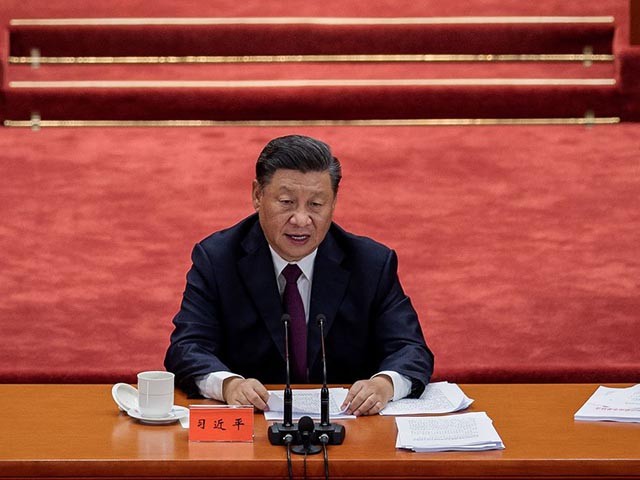China’s communist dictator Xi Jinping boasted of his nation’s achievements in 2020 — a year defined by a deadly pandemic that Beijing could have prevented — during his regular New Year’s Eve speech.
Xi specifically noted China is “the first major economy worldwide to achieve positive growth” in the face of the Chinese coronavirus pandemic, which has prompted nations around the world to limit manufacturing, shut down small businesses, and criminalize economic production.
“China is the first major economy worldwide to achieve positive growth, and its GDP in 2020 is expected to step up to a new level of 100 trillion yuan [$15.3 billion]. China has seen a good harvest in grain production for 17 years in a row,” Xi said, the latter apparently a denial of growing rumors that China is facing severe food shortages.
“China has seen breakthroughs in scientific explorations like the Tianwen-1 (Mars mission), Chang’e-5 (lunar probe), and Fendouzhe (deep-sea manned submersible). Construction of the Hainan Free Trade Port is proceeding with vigor,” Xi noted.
In China, Xi claimed, “[e]verywhere were vibrant scenes of confident, resilient people making the most of every minute.”
The Chinese communist state documented a record-high trade surplus in November. Exports around the world increased 21.1 percent over November 2019 despite widespread reports that Beijing is relying heavily on enslaving its ethnic minority Uyghur population to keep production costs low. Dozens of international companies — including big names like Apple, Nintendo, and Nike — have been implicated in the use of Uyghur slave labor, some believed to be based in concentration camps.
Those not outright enslaved may also be vulnerable to forced labor, particularly in the cotton-picking industry. Offered few other options, many Uyghurs work in the cotton industry, sometimes becoming involved without clear consent, researcher Adrian Zenz revealed last month.
Much of the increase in exports for China has been the product of the pandemic causing other countries to limit their manufacturing sectors, and most economic activity in general. China’s imports from outside also declined, given the limited economic activity around the world, resulting in a staggering $460 billion trade surplus with the rest of the world in November.
The Center for Economics and Business Research, a U.K. think tank, predicted this month that, in part because of the pandemic, China was on a speedier path to becoming the world’s largest economy than it had ever been, and may overtake the United States by 2028. China’s response, through its state propaganda arm the Global Times, was to note that, unless America starts a “cold war” with Beijing, that prediction may come true even sooner.
Xi claimed in his speech Thursday that China had fully eradicated poverty, in part due to this success.
“In 2020, China made the historic achievement of establishing a moderately prosperous society in all respects and achieved decisive success in eradicating extreme poverty,” he claimed.
Addressing the pandemic, which began late last year in the central metropolis of Wuhan, Xi claimed that China “put people and their lives first to interpret the great love among humans. With solidarity and resilience, we wrote the epic of our fight against the pandemic.”
“From medical workers to the people’s army, from scientific researchers to community workers, from volunteers to those who built the projects,” Xi applauded, “from seniors to youths born after the 1990s and 2000s, numerous people fulfilled their missions at the cost of their lives and protected humanity with sincere love.”
In reality, the Chinese Communist Party actively persecuted individuals seeking to limit the spread of what was, to medical experts, clearly an infectious disease by December 2019. Wuhan police arrested doctors and journalists sharing information on how to limit infections — basic instructions like washing hands and maintaining social distancing protocol — or basic information on the outbreak, and forced them to offer the public embarrassing apologies for alleged misinformation. One of those doctors, Li Wenliang, died of a coronavirus infection at age 34 in February. The Communist Party has since attempted to claim him as a martyr.
While Li advised fellow health workers to use infectious disease protections, the Communist Party publicly denied that the then-novel coronavirus was infectious among humans at all, false information spread by the World Health Organization (W.H.O.). The Party also held events that exacerbate the probability of infections, most prominently a Lunar New Year banquet — eaten with shared plates, family-style — for 130,000 people.
“I am proud of our great motherland and people, as well as the unyielding national spirit,” Xi said, concluding his speech on Thursday. “Only in hard times can courage and perseverance be manifested. Only after polishing can a piece of jade be finer. We overcame the impact of the pandemic, and made great achievements in coordinating prevention and control and in economic and social development.”
Xi’s claim that China has “overcome” the coronavirus pandemic fully also belies the fact that several major cities have experienced outbreaks in the past few months, long after Xi declared the local epidemic over in March, his first visit to Wuhan since the first case of Chinese coronavirus was documented there in November 2019. Beijing most recently placed its citizens on alert last week. Tianjin, Harbin, Urumqi, and other major metropolitan centers have also experienced outbreaks long after Xi claimed the problem had been solved.
